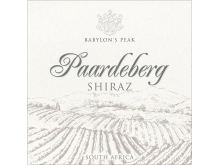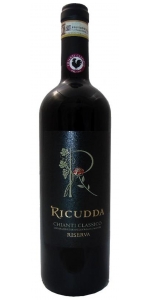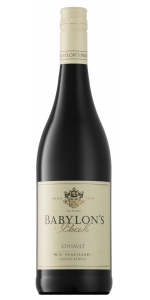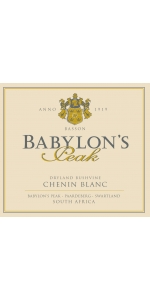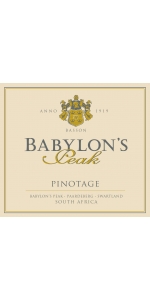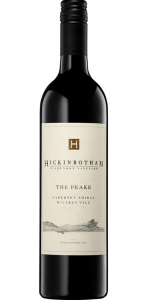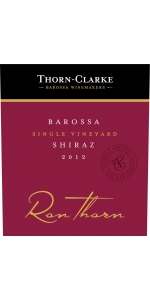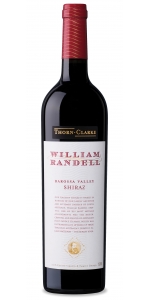Babylons Peak Paardeberg Shiraz 2019
6 bottles with free shipping for: $126.00
12 bottles with free shipping for: $216.00
| BUY MORE! SAVE MORE! | ||||||||||||||||||||
|
| Country: | South Africa |
| Region: | Swartland Region |
| Winery: | Babylon’s Peak |
| Grape Type: | Shiraz |
| Vintage: | 2019 |
| Bottle Size: | 750 ml |
Babylons Peak Paardeberg Shiraz is made from 100 percent Shiraz.
Babylon's Peak winery, situated on the highest weathered granite slopes of the Paardeberg Mountain, is privately owned by the Basson family who has passed down the tradition, passion and art of winemaking over four generations. Predominantly low-yield dryland bushvines are selected to produce these excellent wines with distinctive character.
A classic Shiraz with dark fruit, violets and white pepper. An elegant wine with ripe tannins and a lingering aftertaste.
The grapes were harvested by hand. The grapes were destalked only, no crushing was done. Cold maceration was done before fermentation started in open fermenters. The grapes fermented between 24-26°C for 5-7 days, after which the wine was taken to barrels where it went through malolactic fermentation. After malolactic fermentation was completed, the wine spent 14 months in 225 litre French oak barrels until bottling.
Pairs with rich and creamy meat dishes eg. oxtail and venison.
Babylon’s Peak is a private cellar located on the slopes of the Paardeberg Mountains between Malmesbury and Paarl.
Four generations have farmed here, passing down their winemaking knowledge and passion through the ages. Current winemaker Stephan Basson joined his father in 2003 and started making wine under the Babylon’s Peak brand. Stephan is a passionate and warm-hearted family man. He has dedicated his life to the wine industry and is passionate to keep the Basson legacy alive through the range of characterful Babylon’s Peak wines.
The name Babylon’s Peak is derived from the very high granite peak on the farm, which is known to local people as ‘Babylonstoren’ (in English, ‘The Tower of Babylon’). Some of the highest vineyards in the Swartland region are found here at about 700 metres above sea level. The Paardeberg area is characterized by decomposed granite soils and unique terroir which result in optimum soil expression and fruit purity. All the grapes used for the wines are carefully selected and treated before the wine is made in the traditional way. Being a private cellar, they have the opportunity to select and bottle only the best quality wines.
Ricudda Chianti Classico Riserva 100% Sangiovese.
Deep ruby red color.
The wine shows an intense and persistent bouquet, with notes of berries and spices such as licorice and black pepper. Well-harmonized hints of oak.
In the mouth, it is well structured and balanced, complex, persistent with notes of red fruits and spices such as black pepper and licorice.
Pair with grilled red meats, steak, game of hair and feather, stewed and roasted, aged cheeses hard like pecorino.
Babylons Peak Cinsault is made from 100 percent Cinsault.
Medium to light bodied. Fruit driven with spicy undertones. Soft tannins and fine complexity. A fruit driven wine with lively light palate and lingering mouthfeel.
Review:
"Savory aromas of black olives, grilled meat, thyme, peppercorns and dark fruit. It’s medium-bodied with fine tannins and a flavorful, succulent and peppery palate. Drink now."
- James Suckling (December 2021), 90 pts
Babylons Peak Chenin Blanc is made from 100 percent Chenin Blanc.
Babylon's Peak winery, situated on the highest weathered granite slopes of the Paardeberg Mountain, is privately owned by the Basson family who has passed down the tradition, passion and art of winemaking over four generations. Predominantly low-yield dryland bushvines are selected to produce these excellent wines with distinctive character.
The Chenin Blanc grapes were picked from very old dryland bushvine vineyards. The vineyard grows on weathered granite soils, contributing to the flavor of the grapes and mineral character of the wine. Production is limited to 5 tons/ha.
The grapes were harvest by hand at 22.1°B. The grapes were destalked and lightly crushed. Only the first 450 litres free-run juice per ton were fermented in stainless steel tanks at a cold temperature (10-12°C) for 21 days. The wines was left on the fermentation lees until bottling.
A crisp, fresh and fruity Chenin Blanc from low-yield dryland bushvines.
Pairs with salads, seafood, chicken and other light dishes. The perfect wine for every occasion.
Babylons Peak Pinotage is made from 100 percent Pinotage.
Babylon's Peak winery, situated on the highest weathered granite slopes of the Paardeberg Mountain, is privately owned by the Basson family who has passed down the tradition, passion and art of winemaking over four generations. Predominantly low-yield dryland bushvines are selected to produce these excellent wines with distinctive character.
Dark red color, with ripe plums and mocha on the nose. Dark fruit followed by spice on the palate. A well balanced wine with smooth integrated tannins.
The Pinotage is dryland bushvines, planted on the highest south-east facing granite slopes on the farm. Due to its unique terroir, this vineyard ripens slowly over a very long period. This results in very dark color, soft tannins and good flavor compounds. The baboons normally harvest their quantity first and we pick the rest.
The grapes were harvested by hand at 25,6°B.and destalked only. No crushing was done. Cold maceration was done before fermentation started in open fermenters. The grapes fermented between 24-26°C for 5-7 days, after which the wine was taken to barrels where it went through malolactic fermentation. After malolactic fermentation was completed, the wine spent 12 months in 225 liter French oak barrels until bottling.
Pairs with lamb, bobotie and braaied red meat.
Hickinbotham Peake Cabernet Shiraz is made from 60 percent Cabernet and 40 percent Shiraz.
Named after the late Mr. Edward John Peake who established the first vineyard and orchard at Clarendon circa 1850. Blending Cabernet Sauvignon and Shiraz is a famous part of Australian winemaking history and whilst the individual components of this wine are mighty, the sum of The Peake’s parts is magnificent. The Cabernet shines aromatically with notes of blackberry pie and dark chocolate, while the Shiraz fills the mid-palate with black plum and toasty oak. Fine tannins and balanced acidity contribute to an incredibly long finish. The Peake continues to honor the legacy of this iconic Australian blend.
Review:
Hickinbotham's 2017 The Peake Cabernet Shiraz is a 60-40 blend of the varieties, aged in a healthy proportion of new French oak. As a barrel selection, it stands above the other wines in the lineup, being more complex and complete than either the Brooks Road Shiraz or the Trueman Cabernet. Cassis leads the way, rounded out by ripe cherries and joined by shadings of cedar and vanilla. It's full-bodied and concentrated in the mouth, rich, supple and almost creamy in texture and boasts a long, silky finish. While nearly drinkable already, it should easily age for a decade or more.
-Wine Advocate 96 Points
Deep red with a slight purple hue on release. The wine has a rich mix of dark chocolate infused with coffee bean and black liquorice, then scents of tar, aniseed, raw (pure) soy and black olive on the nose. The palate is expansive, and yet balanced and finessed. An amalgam of dark berried flavors and textural sensations. The 100% new oak is completely absorbed, meshed with ripe tannins, completing a palate of impressive length and youthfulness.
Parcels of fruit for this wine were identified in the vineyard by the winemakers. Daily fruit inspection led to the fruit being harvested at optimum flavor ripeness. The fruit was harvested at night and quickly transported to the winery. The fruit was destemmed to 6T open fermenters for fermentation. A Shiraz specific yeast was selected to ferment the wine and fermentation was carried out at a maximum of 28°C. The fermenter was manually pumped over twice daily in the first half of fermentation to give the winemakers control of color, flavor and tannin extraction. Pump over regimes were adjusted toward the end of fermentation to suit the tannin and flavor extraction of the wine. The cap was completely broken up on each pump over. The wine remained in fermenters for 6-8 days (dependent on parcel) before being pressed, inoculated with malolactic bacteria and filled to American oak (100% new barrels). The wine was racked post malolactic fermentation and returned to the same barrels. The wine was topped every month and after six months racked and returned to the same barrels again. Prior to bottling the parcels were emptied from oak and blended. Minimal fining and filtration was carried out prior to bottling.
Review:
Only made in top vintages, the 2019 Shiraz Ron Thorn is 100% Shiraz from the St. Kitts Vineyard in Barossa. Killer notes of blackberries, black cherries, smoked tobacco, chocolate, and subtle menthol all define the aromatics, and it hits the palate with full-bodied richness, a round, layered mouthfeel, huge mid-palate depth, and a salty, decadent style on the finish. This monster of a Shiraz stays balanced and light on its feet and is beautifully done.
-Jeb Dunnuck 96 Points
Thorn Clarke William Randell Shiraz is made from 100 percent Shiraz
The William Randell range of wines were created in honor of our family ancestor - the esteemed pioneer William Richard Randell (1824 - 1911). The wines are sourced solely from grapes grown on our estate vineyards. Wines in this range are only made in exceptional vintages.
Deep red with inky purple hues. This classic Barossa style shows rich blackberry, licorice, spice plum and smoky oak on the nose. The palate is dense with ripe mulberry and berry compote and generous supporting oak. The tannins are savory and long with spicy refined finish
Following harvest the fruit was crushed into a variety of small fermenters (4 to 6T in capacity). Fermentation was carried out at a warm temperature (25-28 degrees ). The ferments were manually pumped over to provide good control of tannin extraction. Each fermenter was treated as a separate parcel of wine and once dry was filled to American oak (40% new). Following malolactic fermentation the wines were racked and returned to the same oak. Parcels remained in barrel for an average of 18 months prior to blending. Only the best barrels from the multiple parcels were used to make the final blend. Once blended the wine was prepared for bottling.
Review:
"This impressive and manicured 2019 Shiraz William Randell has class written all over it. Ripe and concentrated with black cherry, dark earthy tones and ham bone aromas wrapped up in a generous dose of sweet oak. Luscious levels of flavor and oak follow with well-judged tannins providing a complete package to enjoy over the next decade.- Angus Hughson"
- Antonio Galloni's Vinous (March 2023), 92 pts
- back
Turley Pesenti Zinfandel is made from 100 percent Zinfandel.
Deeply perfumed and enthralling nose of ripe red fruits, high-toned spices, orange zest, and an almost minty crushed chalk. Palate is smooth, lush, energetic, and pure, with a smack of well-toned acidity, satiating structure, and a long, precise finish.
Reviews:
Medium ruby in the glass, the 2022 Zinfandel Pesenti Vineyard is refined and pure on the nose, leading with varietally classic aromas of yellow peach, wild red berry jam, touches of woodsmoke and tomato leaves and a mix of earth-driven, evergreen aromas. The palate clearly shows its warm-climate origins with its rich, concentrated, explosively perfumed red fruit flavors. It admirably retains precision despite this massive frame and is lined with fine-grained, generous tannins. The finish is led by peachy, fruit-driven perfume with just enough tangy acidity to prop up the long, juicy finish that calls you back to the glass.
-Wine Advocate 95 Points
Winzer Von Erbach Goldmuskateller Rheingau Feinherb is 100% Goldmuskateller.
The old name for the Erbacher Honigberg was Wachholderwiesen-juniper meadows.
At the Wachholderwiesen there was an uprising of the peasants in the 16th century, all of the ringleaders were hanged.
The muskateller has a smell of elder-berries, apricots and quince, aftertaste of nutmeg.

